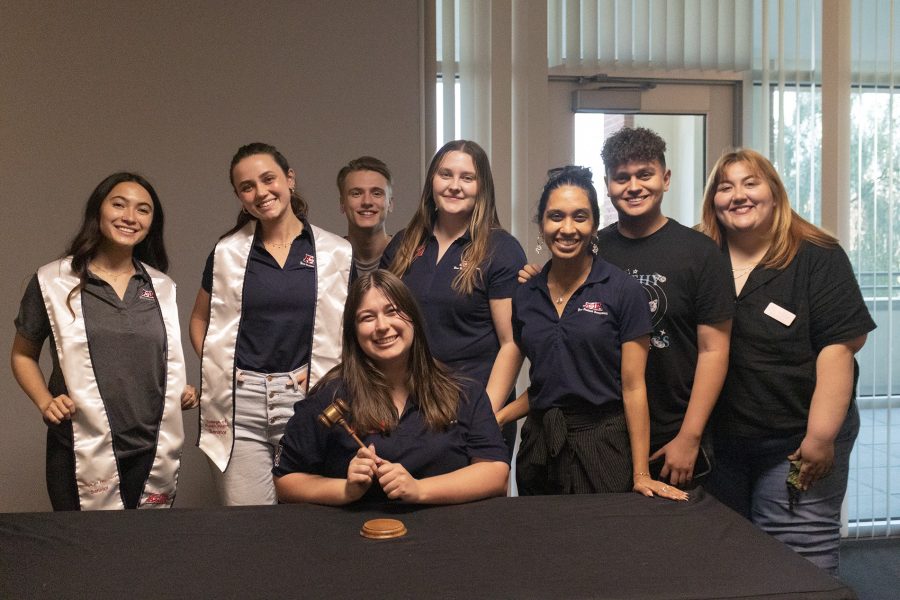The Associated Students of the University of Arizona have wrapped up their year with their final meeting on Wednesday, April 27. From bringing free Thanksgiving meals to students to canceling their annual Spring Fling for the third year in a row and impeaching a senator, ASUA has marked their first in-person year back since the pandemic began with highs and lows. Here are a few highlights of the UA’s undergraduate student governing body from the 2021-22 academic year:
UAZ Divest Resolution
One of the first things this year’s senate class did was pass the UAZ Divest resolution on Sept. 8, 2021. The unanimously passed resolution was support for UAZ Divest’s mission, calling on the university and UA Foundation to completely divest funds from the fossil fuel industry by 2025, as well as support the proposition of including student voices in the UA Foundation’s investments.
ASUA President Noah Vega and Administrative Vice President Kyle Kline met with UAZ Divest the following month, after which Vega reported, “[the fossil fuel companies] have already invested a lot of money into UA, and the Arizona Foundation realizes it would be a financial mistake to take that away.”
At the end of the fall semester, Kline and Vega met with the UA Foundation again for an update. The UA Foundation stated that there was no way they could divest until 2029 and could not set the original hard date asked by UAZ Divest because they would lose $20 million. They also told Kline that they don’t intend to divest from fossil fuels.
Constitution Referendum
Kline was the primary author of the ASUA constitution referendum, which is a simplified version of the old constitution. The new constitution set out to eliminate the house of representatives passed by the 2019-20 senate and also to simplify it, making it easier to navigate. You can read more about the changes to the constitution on the Daily Wildcat website.
The referendum was passed by the senate, which sent it to a simple majority vote at a special election for students. The election was held April 27-28, but the results have not been made available on their website or social media pages.
Senate Initiatives
Every year the ASUA senate class puts their $20,000 towards a big initiative to help the student population. The first proposed senate initiative was a 24-hour community study space following changes in library hours due to COVID-19. Collectively, they heard many students express frustration with these changes and the lack of a 24-hour study space on campus.
The senate hit a roadblock when they discovered that “for the Main Library to stay open 24/7, the facility would need to receive an extra $1 million in funding annually,” according to ASUA Executive Vice President Ally Devereux. Vega met with UA President Dr. Robert C. Robbins to see if he could help. Robbins expressed he would be interested in finding the funding for this.
Related: Policy banning student organizations from tabling rectified, students demanding long-lasting change
As part of their initiative, the senate allocated $5,000 of their budget to Arizona Student Unions to directly fund free, grab-and-go Thanksgiving meals for food insecure students or students who could not go home for the holidays.
By the Jan. 26 meeting, no other initiative had been decided upon, causing tension among the senators and executives. There were two proposed initiatives: a community garden and renovation of their ASUA office.
At the Feb. 2 meeting, another initiative was proposed for a campus thrift store that would happen during the fall semester of students’ old belongings from the previous year. The things would have to be stored over the summer though, which is what caused Kline to shoot the idea down, citing it “infeasible” because of the cost of storage.
The renovation of the ASUA office was ultimately decided on.
“‘Renovation’ is honestly the wrong word to use for it,” said Ziana Collins, senator of the College of Pharmacy. “It’s more of just turning it from what it is into a collaborative space.”
Personnel Complications
The senate started the year with vacancies in the College of Medicine, the College of Agriculture and Life Sciences, the College of Humanities and the Mel and Enid Zuckerman College of Public Health senator positions.
In October, Devereux hired four senators for these positions, stating that, historically, some of these colleges did not have positions filled and were not well-represented in ASUA.
It was later found by Daily Wildcat news reporter Kristijan Barnjak, in an article titled “A lackluster year for student government,” that there is no senate seat for the College of Veterinary Medicine. Barnjak reported, “Sylvester Gaskin, associate dean of students for student governance and programs, confirmed to the Wildcat that the College of Veterinary Medicine senator was hired by mistake, and no seat exists for the college. [Anne] Zlatow is also a graduate student, while ASUA is an undergraduate student government.”
The Colleges of Medicine, Optical Sciences and Agricultural and Life Sciences never had their senate seats filled.
Barnjak also found that five senators had missed a quarter or more of ASUA’s meetings at the time the article was published. Senate absences were never initially available to the public, even when asked for by Barnjak. Devereux later released the absences at the March 16 meeting.
Senator for the College of Science Louise Lalescu was impeached at the March 13 meeting with eight votes in favor, three against and two abstained. The impeachment was automatic, brought on by five unexcused absences. It was announced the ASUA Supreme Court had confirmed the impeachment at the April 20 meeting.
Follow ASUA on Twitter @ASUAToday and Instagram @ASUA_Senate for updates about the next senate class and the fall semester.
Follow Maggie Rockwell on Twitter








